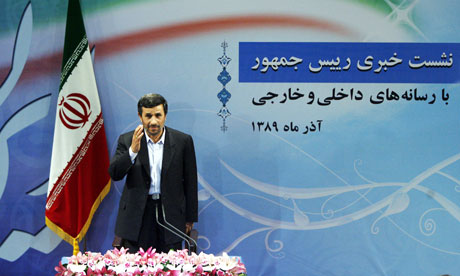WikiLeaks claims are 'psychological warfare' says Ahmadinejad
Iranian president claims that the leaks are part of a campaign of psychological warfare against his country

Iran today hit back at the latest batch of Wikileaks revelations, with its president, Mahmoud Ahmadinejad, claiming that the leaks were part of a psychological warfare campaign against his country.
Iranian media also commented that the United States does not trust its "agents" inside the Islamic republic and alleged US links to the mass protests that followed last year's disputed election.
Press TV, the English-language Iranian TV channel, highlighted evidence from state department cables that US diplomats are apparently engaged in espionage — a charge that will have special resonance in a country where the empty US embassy is still routinely referred to as "the nest of spies".
Official media in Tehran are also expected to highlight the efforts the US is devoting to containing Iran and especially its nuclear programme.Arab governments maintained a discreet silence but Arabic-language media highlighted Guardian reports that Saudi Arabia and Bahrain in particular had advocated military action against Iran to stop its nuclear programme. "The Arabs agitated against Iran," the Qatar-based al-Jazeera TV headlined its main story. Its rival, the Saudi-owned al-Arabiya, initially made no reference to King Abdullah's call to attack Iran "to cut off the head of the snake" or to similarly hawkish comments by King Hamad of Bahrain, but later changed its story to include these.
The Saudi paper Okaz zoomed in on warnings by the British government that the massive leak could endanger lives. Other Arab media headlined stories focusing on Israel's ability to attack Iran as well as Tehran's acquisition of long-range missiles. The Saudi Gazette reported the WikiLeaks story but without mentioning the kingdom. In Abu Dhabi, capital of the UAE, where crown prince Mohammed bin Zayed al-Nahyan was reported as making bellicose remarks about Iran, the English-language paper The National did not report any local link to the WikiLeaks story.
In Israel the prime minister, Benjamin Netanyahu, said that he felt vindicated by revelations about the extent of international and Arab concern about Iran and its nuclear programme. "Israel has not been damaged at all by the WikiLeaks publications," Haaretz quoted him as telling a group of editors in Tel Aviv.
"The documents show many sources backing Israel's assessments, particularly of Iran. Our region has been hostage to a narrative that is the result of 60 years of propaganda, which paints Israel as the greatest threat. In reality leaders understand that that view is bankrupt. For the first time in history there is agreement that Iran is the threat," he said, adding that he hoped leaders would now say openly what they had long been saying in secret.Iranian media made no mention of a 2009 diplomatic cable saying that supreme leader Ayatollah Ali Khamenei has terminal cancer.
But one website, alef.ir, which is a website affiliated to the Revolutionary Guards, focused on suggestions of US links with Iranians protesting at the outcome of the 2009 election. "The interesting parts of this documents are those which show that the rioters in the aftermath of the election are linked to the American diplomatic service and they have been consulted by them."
